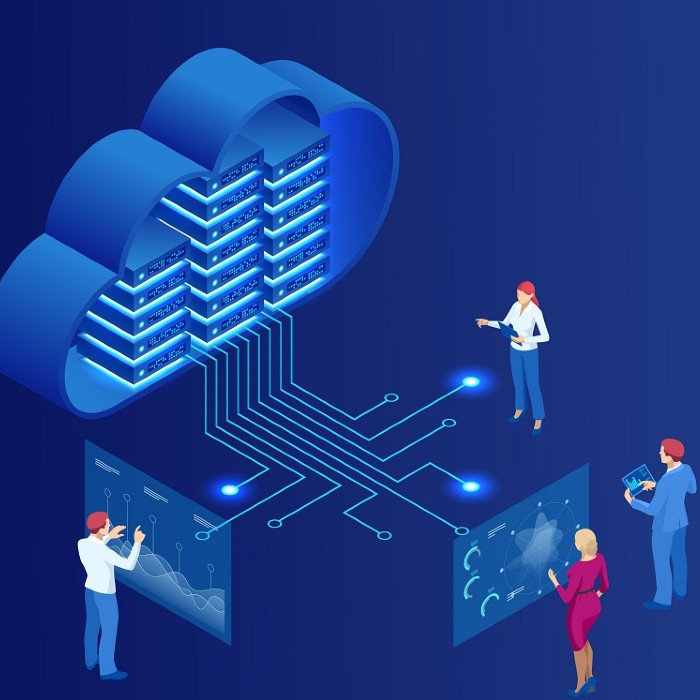Software developer. Data scientist. Artificial intelligence specialist. Computer systems analyst. DevOps, SecOps and cloud platform engineers. These are just some of the job positions that are critical to enterprise IT teams as they evolve their computing capabilities into the hybrid multicloud era, where applications and data run in a variety of hardware and software platforms. The steadfast focus on innovation and optimization of cloud technologies is opening career paths like never before.
“Cloud computing will enable the Lindbergh moment,” physicist Mark P. Mills told The Forecast in a 2022 interview. He was referring to Charles Lindbergh’s first nonstop solo flight across the Atlantic Ocean, which symbolized a bold technological advancement that ushered in the age of intercontinental air travel.
“Cloud is the biggest infrastructure that humanity has ever built,” said Mills, author of The Cloud Revolution: How the Convergence of New Technologies Will Unleash the Next Economic Boom and a Roaring 2020s. “No infrastructure has ever been as big as the cloud.”
What made the Lindbergh moment so awesome wasn’t just the new ability to fly long distances. Rather, it was the irrefutable example of how technology unleashes and enables human potential. According to Mills, cloud’s Lindbergh moment is like a big bang causing ripples across all the world’s economies. Alongside cloud-powered technologies like artificial intelligence (AI), the Internet of Things (IoT) and virtual reality (VR), it will create waves of cloud computing job growth and new cloud computing career paths reaching into every enterprise.
Cloud Computing Job Growth
Over the last decade, the IT industry has evolved from cloud adoption to cloud maturity. And so have IT careers.
With the rise of cloud-based applications that fuel remote work, the cloud now powers an entire digital workforce. So much so that the World Economic Forum now identifies cloud computing as one of the four most important skills people will need to thrive in the workplace of the future.
“Cloud computing remains the No. 1 most sought-after skill,” Megan Slabinski, a district president at recruiting firm Robert Half, said in a 2021 interview with SuccessDigest.
“The demand has never been higher.”
Unfortunately, there is a skills gap — a lack of people needed to run, manage and grow IT operations under this new, massive cloud infrastructure. Recent studies show that while 75% of tech leaders are building products and features using cloud computing, only about 8% have “significant cloud-related skills and experience.”
As companies continue to move not only their IT operations to the cloud but also their core business functions, demand for cloud-literate professionals will skyrocket. That could create a big opportunity for young people who are planning to follow a cloud computing career path.
New Careers, Familiar Mindset
Cloud computing job growth demands a host of new technical skills, such as scripting, monitoring and automation. But problem solving is still the lifeblood of a healthy IT operation, according to Darren Lowe, director of systems engineering at Nutanix.
“It doesn’t matter if you are the best at writing scripts and the best at writing code,” Lowe said. “If you’re a natural problem solver, it’s a great opportunity and a great time for you.”
With cloud vendors, you don’t need to know how everything works in the background, Lowe pointed out. But knowing how to troubleshoot when something goes wrong is a skill that will always be valuable.
Lowe speaks from experience. He started his own IT career two decades ago by building servers from scratch. To do so, he needed to know how it all worked and fit together: the chassis, circuit board, CPU, memory and hard disk. Because IT operations bought servers and hardware on three- to five-year depreciation cycles, they had to use them. When problems came up, merely throwing more computing power at them wasn’t an option.
“Even if we could buy more hardware, there was no room to plug it in,” Lowe said. “You had to be more creative in how you were trying to solve problems.”
Thanks to the cloud, adding more computing power is now as easy as clicking a mouse. While is awesome for meeting new digital needs, it also comes with new challenges.
“You just say, ‘I want a database,’ and you get a database,” Lowe continued. “When that doesn’t work or is not performing how you think it should, that’s where you are kind of stuck.”
While IT architects and engineers will remain vital, to flourish in the future at cloud-based enterprises also requires so-called soft skills like creativity, critical thinking, teamwork and leadership. Lowe said it’s increasingly important to be an expert in one area while being compitent across connected or related area.
“You have to be fearless about working with others and learning new things,” he said.
Cloud Computing Career Paths
Technical skills are critical, but IT teams in the cloud era need talent with a different kind of toolbox, according to Lowe, who said he has witnessed an enormous change in IT operations over the course of his career. Tasks that used to take weeks now take seconds, which means future IT professionals will spend their time on tasks that their forebears couldn’t.
Consider automation. Although it always promised speed and efficiency, there wasn’t enough integration to deliver on that promise. IT teams therefore spent weeks writing scripts in multiple languages to do “one little piece of automation,” explained Lowe, who said the advent of application programming interface (API) calls has fundamentally changed automation workflows.
“API calls are key to everything now,” Lowe said.
“It’s the only way that you can really scale and deliver things fast, and that’s really where everything’s going. It doesn’t matter if it’s infrastructure services like Amazon, Google and Microsoft, or if it’s a SaaS application. We drive everything through APIs now, and we couldn’t do that 10 years ago.”
The shift means that candidates with automation on their résumé now stand out from the crowd when Lowe is hiring for his team, regardless of whether their experience is with databases, servers or applications.
“It doesn't really matter what you are automating as long as you understand how to do it,” Lowe continued. “Because at the end of the day, it’s just a different system that you need to script for.”
Monitoring is another skill that will be pivotal in an era of cloud computing job growth, according to Lowe, who said people who write scripts too often assume that they will work when in fact they don’t. It’s therefore vital to be able to test scripts while writing them, as catching errors early ensures efficiency.
Sustainability monitoring, in particular, is in demand as a result of climate change. As data centers and their corporate customers reckon with their energy use, it has the power to help companies — including Big Tech — decrease their carbon footprints in pursuit of a cleaner, better tomorrow.
“Monitoring isn’t just a graph, or a chart that just has some wavy lines,” Lowe said. Monitoring includes how to read logs, how to visualize those logs and how to pick out errors in the log. I think that’s crucial.”
It’s crucial not only for the enterprise but also for the economy. Because if IT organizations can build the right teams with the right skills, cloud computing’s Lindbergh moment could yield positive returns for generations to come.
Jacob Gedetsis is a contributing writer. His work has appeared in The Kansas City Star, The Post Standard and The Plain Dealer, among others. Find him on Twitter at @JacobGedetsis.
© 2023 Nutanix, Inc. All rights reserved. For additional legal information, please go here.





